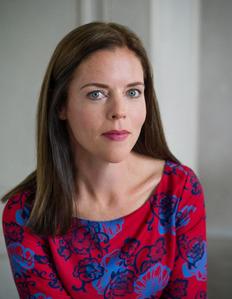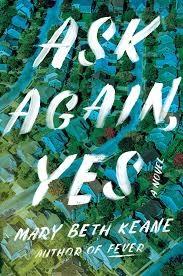
|
|
| photo: Nina Subin | |
Mary Beth Keane attended Barnard College and the University of Virginia, where she received an MFA. In 2011, she was named one of the National Book Foundation's "5 under 35," and in 2015 she received a Guggenheim fellowship. She lives in Pearl River, N.Y., with her husband and their two sons. Keane is the author of two previous novels, The Walking People and Fever; her new one is Ask Again, Yes (Scribner, reviewed below).
Tell us about your inspiration for Ask Again, Yes.
Ask Again, Yes came about slowly. I'd been working on another novel but wasn't getting very far. Friends and family around me were struggling with old demons and new ones: addiction, infidelity, divorce, depression, estrangement. There was joy, too--people having children, finding love, doing well at work, but in many cases the joy seemed tempered by what came before.
Some of our parents were becoming elderly and wanting to talk about things that had happened a long time ago, things they'd been carrying, unspoken, for 30 or 40 years. And some, very notably, still did not want to talk about those things. I began writing Ask Again, Yes partly as a way to work through all these issues and decide what I thought of them. This novel is not autobiographical, but its themes are drawn from my life.
The story is about the Stanhope and Gleeson families on so many levels: Francis and Brian, Lena and Anne, Peter and Kate. How did you set up all those different connections and the ways they intertwine?
I really don't know! Years of trial and error, and a lot of cut pages. There were some characters I could just see right from the beginning. I could see Francis walking his beat, feeling sort of conflicted about being a cop in the first place. I could see him becoming a great cop and rising through the ranks. I could see Lena's beautiful curly hair and all the expectations she had for marriage and motherhood. And then I could so clearly see the love between Peter and Kate.
Some early readers told me I had to pick either the parent generation or the kid generation and focus, but my gut kept telling me it all mattered, that they were all in this book together. One thing leads to another, which leads to another.
It took a long time to figure out what that opening scene in 1973 has to do with what comes later. It's just an average day on the job, really, but life is filled with average days, and that was an issue that kept cropping up as I was writing. Which day should be highlighted to represent all the others, and which should be cut? One of the things I thought about a lot while I was writing this book was how people's lives have an impact on each other in totally unexpected ways.
 Peter spends his teenage and young adult years trying to be extremely responsible and take care of himself, partly as a result of his mother's mental illness. How is this a story about mental illness and its effects on families?
Peter spends his teenage and young adult years trying to be extremely responsible and take care of himself, partly as a result of his mother's mental illness. How is this a story about mental illness and its effects on families?
I've seen mental illness up close in different incarnations, and it's harrowing. It's tragic enough for the people who get help, but for the people who don't--all the potential love and connection they might have had in life disappears. How do you make someone who needs help get help? We can make children do things they don't want to do: take medicine, see a doctor, spend time in a hospital. But what if that person is an adult? And part of the person's pathology is believing she's not ill?
Peter's way of coping with his mother's illness in the beginning of the book (and Brian's, too) is the one I'm most familiar with. They sort of pretend it's not happening and live around it instead of facing it. We all come up with narratives to explain things in our lives that are not really explainable, and believing those narratives becomes crucial to day-to-day survival.
This is also a story about forgiveness: not only Francis and Peter (and other characters) forgiving Anne, but various characters forgiving each other and themselves.
It's funny, I guess, but when I'm writing a novel--and I think I speak for most novelists here--I don't really think about themes. I didn't think about forgiveness in a broad sense, or whether I was saying anything about it. But I suppose forgiveness, or refusal to forgive, was one of those things that was coming up a lot in real life, back when I thought I was writing a different novel.
My feeling is that when we try to put ourselves in someone else's position--if we try to imagine knowing only what they know, try to imagine having only that person's experiences--then it's easy to forgive. Especially as I get older, I have a lot of sympathy for good people who mess up, especially when those people call themselves on it. What's the point of holding on to judgment and grudges? It's exhausting. And we're all messing up in one way or another. Often, when a person does a "bad" thing, it's a form of extreme selfishness. But maybe that selfishness is born out of wanting to make a desperate grab at life. I have sympathy for that.
However: forgiveness is often discussed in the larger cultural conversation in a way I don't identify with at all. If there's a break between a parent and a child--such as Peter has in the book, separately, with each parent--I think forgiveness is always a good thing, but that doesn't mean getting on the phone with each other once a week. It doesn't mean suddenly including that person at Christmas dinner. I'm not sure Peter ever forgives Brian, and I'm not sure he should. But maybe, after he makes some mistakes himself, he understands his father a little better. --Katie Noah Gibson

